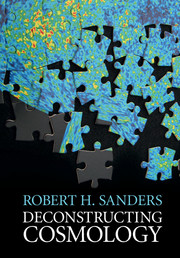Book contents
9 - Dark Matter, MOND and Cosmology
Published online by Cambridge University Press: 12 October 2016
Summary
The Puzzle
Dark matter does not have the predictive power of MOND on the scale of galaxies. Yet cold dark matter has gained almost unquestioned acceptance by the majority of the relevant communities, while MOND has languished for more than 30 years outside of the mainstream. This is not because of some grand conspiracy against the idea of modified dynamics, but rather because of strong social factors that maintain support for the prevailing paradigm. There is an overriding tendency for scientists to function within the established framework and to select data that reinforce rather than challenge it (an effect that is supported by competition for academic positions and grants). There is a very large community (thousands) of physicists, astronomers and cosmologists with vested career interests in searching for and detecting dark matter – underground, above ground, in space, under-water, in the Antarctic ice. Moreover, in this case there is also an understandable reluctance to tamper with the historically established laws of physics; this is not what astronomers do. Physicists have a different culture, but most models for dark matter involve extensions of the standard model of particle physics; this sort of new physics is of general interest to the relatively large community of high-energy physicists and is perceived as less intrusive than modifying the venerable laws of Newton.
Beyond social factors, though, there is a reductionist current in modern science in general that in this area of research assigns priority to cosmology over mere galaxy phenomenology. Although the respectability of cosmology is quite recent, the science of the entire Universe is now considered to be more fundamental than that of its individual constituents. The pattern of anisotropies in the CMB is very well explained by the standard cosmological model, albeit with a somewhat unnatural combination of six free parameters. And given the precision of the fit to the angular power spectrum of these anisotropies, then, the reasoning goes, the theory must be correct even in its perceived implications for galaxies. So most cosmologists tend to be dismissive of mere galaxy phenomenology and its wealth of regularities; these are details and are due to messy baryonic physics that will be understood someday in the context of more detailed computations of the processes of star formation and feedback. It is certainly not serious enough to require a modification of Newton's (and therefore Einstein's) laws.
- Type
- Chapter
- Information
- Deconstructing Cosmology , pp. 115 - 125Publisher: Cambridge University PressPrint publication year: 2016



